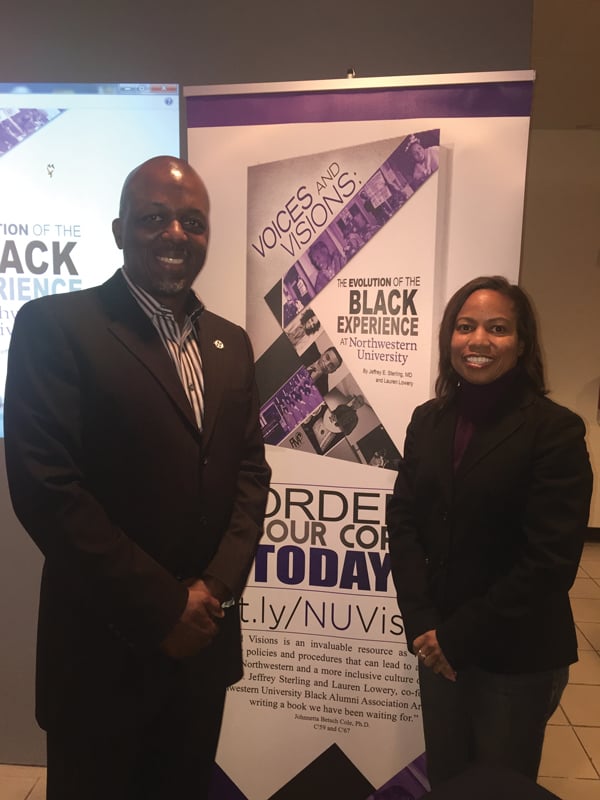New book by former NUBAA leaders explores the black experience at NU
Jeffrey Sterling (Weinberg ’85) and Lauren Lowery (McCormick ’89). Their book, “Voices and Visions: The Evolution of the Black Experience at Northwestern University” is a collection of narratives from black alumni, staff and faculty documenting their time at NU.
October 31, 2018
A&E
On May 3, 1968, about 120 black students took control of the University’s Bursar’s Office for 38 hours to protest the treatment of black students at Northwestern. The Takeover’s 50th anniversary — commemorated nearly six months ago — marked one of the first major protests at NU and highlighted what demands had yet to be met.
While preparing for the 50th anniversary celebrations, former president of the Northwestern University Black Alumni Association Jeffrey Sterling (Weinberg ‘85), said while a clear historical record of the Bursar’s Office Takeover existed, there were large gaps in the account of the black experience at Northwestern.
“There were stories that needed to be told on many levels,” Sterling said. “We have a fantastic history that is not totally told by the story of the bursar’s office takeover.”
Sterling and former NUBAA vice president Lauren Lowery’s (McCormick ‘89) book “Voices and Visions: The Evolution of the Black Experience at Northwestern University” explores these missing stories. “Voices and Visions” is a collection of narratives from black alumni, staff and faculty documenting their time at NU. The book was released July 9, shortly after the Takeover’s anniversary, and is available in the Northwestern library and archives, as well as bookstores.
“Voices and Visions” includes 56 entries, beginning with the earliest black attendees of the University and coming to a close with stories about the future of black students at the University. The book includes narrative stories because they are the best way to paint a picture of one’s experience, Sterling said.
Charla Wilson, University archivist for the black experience, said the archives serve as a way for the public to become connected with the important history of black students at Northwestern.
“I think my work as the archivist for the black experience is important because the history of black students, faculty and alumni is rich and a significant part of Northwestern’s history,” Wilson said.
She also discussed the importance of her role in documenting the lives of black students at Northwestern in “Voices and Visions.”
Wilson’s entry goes into detail about her role as an archivist — not only does she fill in the gaps of the University’s records, but also works to make sure more aren’t created. Her mission, she said, is to uncover stories that have yet to be included in the collection.
“It is important to note that African American history at Northwestern University is Northwestern history,” Wilson wrote in her entry.
Kevin Leonard, a fellow University archivist, said his role supports anyone who needs to use the historical collections. He said Sterling and Lowery have been “extremely active in getting Northwestern to better appreciate and recognize its heritage.”
While he was NUBAA president, Sterling said he witnessed faculty members and administrators responsible for implementing policies pass through their roles unaware of the history surrounding the black experience at Northwestern. Because of this, he said he wanted to help others understand the historical struggles of black students.
Even though Sterling is critical of his time at NU, he still values the experience he had on campus and considers his undergraduate career to be the best four years of his life.
“There were clear instances where I was challenged in ways that were uncomfortable at times, inappropriate at times and discriminatory at times, however all of those things were a part of my education,” Sterling said. “I believe that I was fortunate to be able to view it in real time as part of my education in a way that was constructive instead of something that literally destroyed me.”
Email: [email protected]


